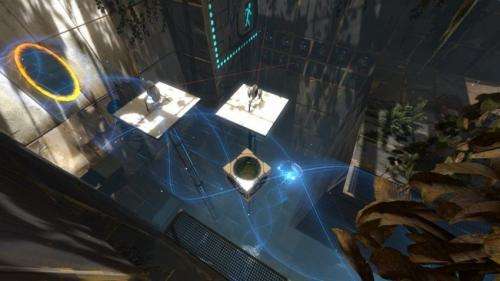October 2, 2014 report
Study finds Portal 2 better at improving cognitive skills than Lumosity

(Medical Xpress)—A trio of researchers at Florida State University has conducted a small study the results of which suggest that the video game Portal 2 is better at improving cognitive skills than the "brain-trainer" Lumosity—a web based system that has been designed to improve such skills. In their paper published in the journal Computers and Education, Valerie J. Shute, Matthew Ventura and Fengfeng Ke describe their study and results and note that more work needs to be done with computer software that is created to help improve brain performance.
All three of the researchers are in the education department at the university—they do studies on the psychology of education. In this latest effort, the team decided to test Portal 2 against Lumosity after discovering that one of the team members really liked the game, and thought it helped improve her cognition skills.
Lumosity and others like it are commercial products that are sold as brain-training or work-out games that take advantage of what neuroscientists have discovered only recently—that human brains have plasticity, which means they are capable of growing and changing. Prior research had suggested that once the brain developed it stayed the way it was throughout a person's life. Brain-training products take the user through an array of screens based on puzzle-solving, which is interestingly, the same basic idea behind Portal 2—gameers have to solve puzzles to get to other portals.
To test the two games against one another, the researchers enlisted 77 volunteers who were divided into two groups, one group playing one game, the other the other game—both were asked to play for eight hours—each was given standardized tests that measured problem solving, spatial skills, and persistence, before and after play to determine if playing had impacted their skills. The researchers found that those who had played Portal 2 showed a "statistical advantage" over those who'd played Lumosity—they note that the reverse was never true with any of the volunteers.
The researchers acknowledge that their study is small—too small to actually prove that Portal 2 is better at improving brain skills, than Lumosity, but they hope that what they've uncovered will lead to larger studies that will eventually lead to ways of testing software products meant to improve brain performance.
More information: The power of play: The effects of Portal 2 and Lumosity on cognitive and noncognitive skills, Computers & Education, Volume 80, January 2015, Pages 58–67. DOI: 10.1016/j.compedu.2014.08.013 (Full text PDF)
Abstract
In this study, we tested 77 undergraduates who were randomly assigned to play either a popular video game (Portal 2) or a popular brain training game (Lumosity) for 8 h. Before and after gameplay, participants completed a set of online tests related to problem solving, spatial skill, and persistence. Results revealed that participants who were assigned to play Portal 2 showed a statistically significant advantage over Lumosity on each of the three composite measures—problem solving, spatial skill, and persistence. Portal 2 players also showed significant increases from pretest to posttest on specific small- and large-scale spatial tests while those in the Lumosity condition did not show any pretest to posttest differences on any measure. Results are discussed in terms of the positive impact video games can have on cognitive and noncognitive skills.
© 2014 Medical Xpress


















